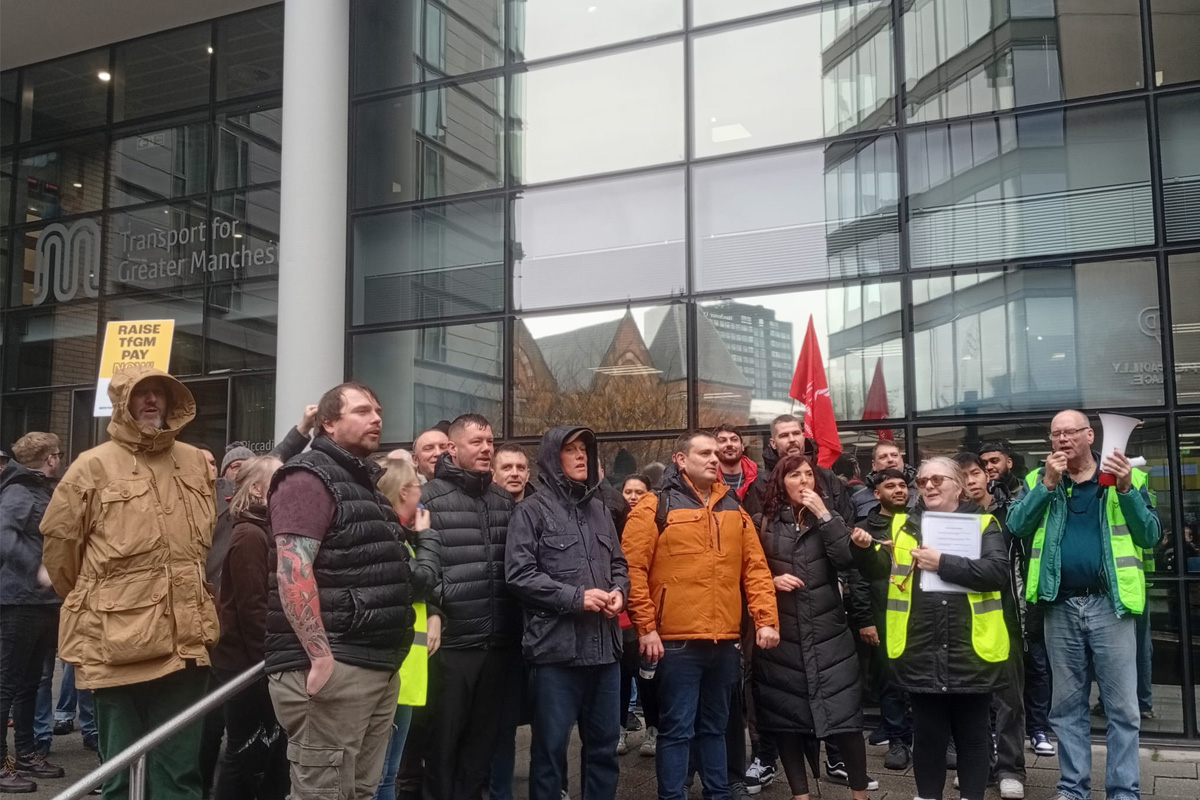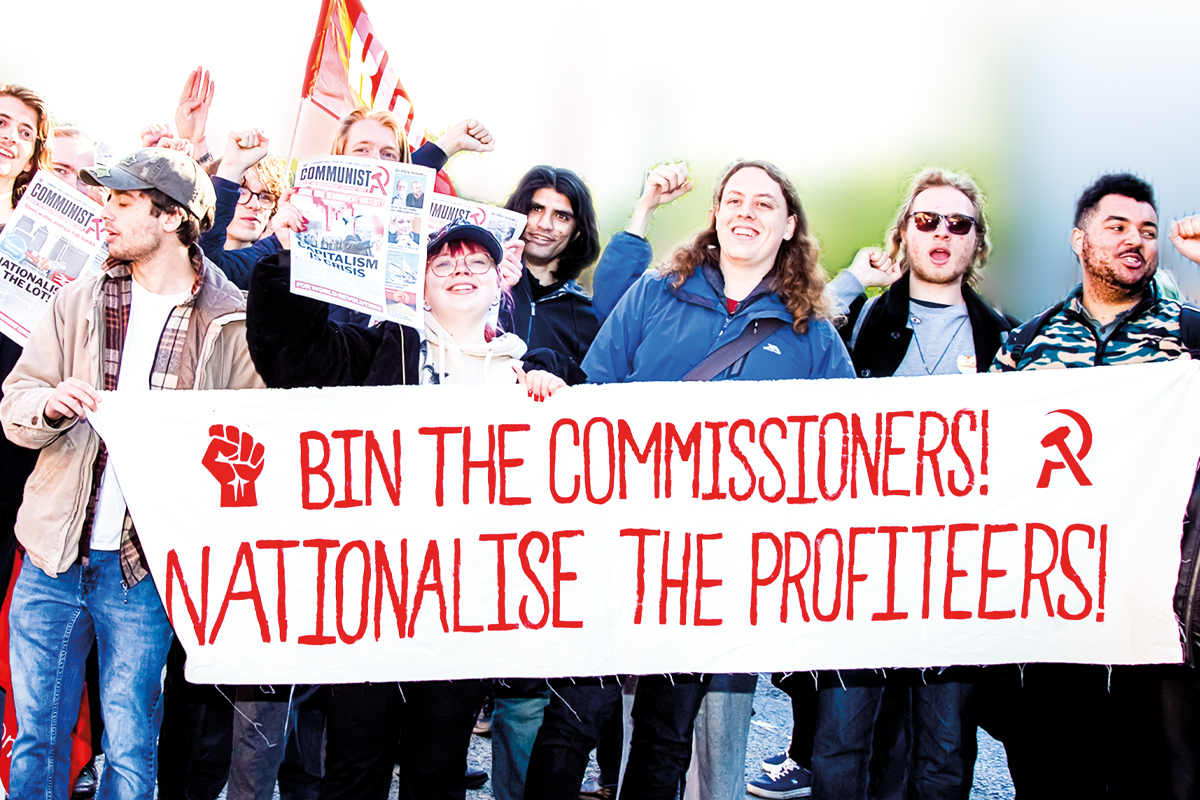With the conflict in Palestine entering its seventh month, the question of how to bring an end to Israel’s genocidal massacre is becoming ever more pressing.
Many workers are desperate to see action that can stop the slaughter, and are therefore looking to their mass organisations – the trade unions – to offer some direction and take a lead in the Palestine solidarity movement.
Many unions have issued statements. Some have even encouraged lunchtime walk-outs and other symbolic ‘action’ in solidarity with Gaza.
Unfortunately, however, there has been little in the way of more serious action from the trade unions when it comes to stopping Netanyahu’s war.
In truth, the labour movement has barely lifted a finger when it comes to directly opposing British imperialism – a key ally of Israel, and the main enemy at home, against whom workers in Britain should primarily be aiming their fire.
Unite’s failures
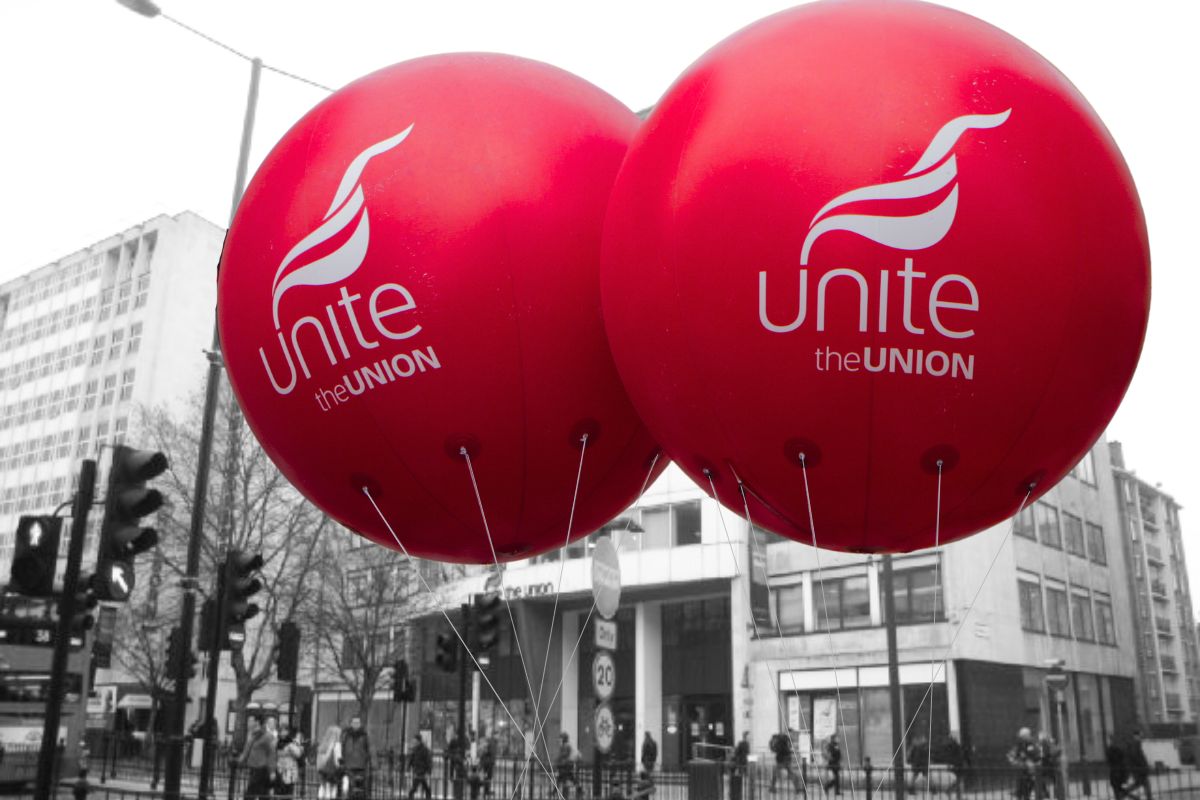
As the catastrophe in Gaza escalates, debate has intensified around this question. In recent months, this has revolved around the question of arms factories in Britain, including criticism of the two major unions that organise workers within these: GMB and Unite.
Most of the ire has been directed at Unite, as one of the largest trade unions in Britain, and as an influential organisation on the left of the movement.
GMB is generally viewed as a more ‘moderate’ union. Under Sharon Graham’s leadership, by contrast, Unite has increasingly moved to take more militant industrial action. This has understandably built up Graham’s authority in the eyes of many workers.
Graham’s prior stance on the industrial front has made the disappointment over Unite’s passivity on Palestine all the greater. Her union organises workers in factories that make weapons that are sold to the Israeli military. Yet the Unite leaders have completely failed to utilise this potential power at their fingertips to halt the imperialists’ war machine.
This has led to various initiatives by rank-and-file members angered by this inaction. The union has come out in favour of a ceasefire – but members clearly want more.
Open letters are circulating, garnering hundreds of signatures. And with the formation of the group ‘Unite4Gaza’, this anger has gained an organised expression.
This discontent is correct and legitimate. The Palestine solidarity movement more broadly must organise union activists to channel this energy into their organisations, in particular Unite, in order to demand real action.
Factional struggle
This issue has also been weaponised by critics of the Graham leadership, however – most notably, those supportive of the old United Left (UL) bureaucracy within the union.
Having been dethroned following Graham’s election in 2021, UL has consistently played a wrecking role against her leadership: both from within the union, and via the Skwawkbox blog that is loosely affiliated to their faction.
This sabotage is no doubt motivated, in part, by investigations that have either been launched or strengthened by Graham into various instances of potential corruption that took place under UL’s tenure at the top.
UL’s attacks on Graham are completely cynical. After all, the old Unite leadership also did nothing to mobilise members during previous Israeli military campaigns against Palestinians.
In reality, these bureaucrats are simply trying to throw whatever they can at the union’s current leaders, for their own factional interests.
Imperialism
This does not mean that the Graham leadership should have a get-out-of-jail-free card on the question of Palestine, however.
In Britain, Graham has overseen a surge in industrial militancy. But on international issues, her time in office has been consistently characterised by parochial nationalism and a pro-imperialist outlook.
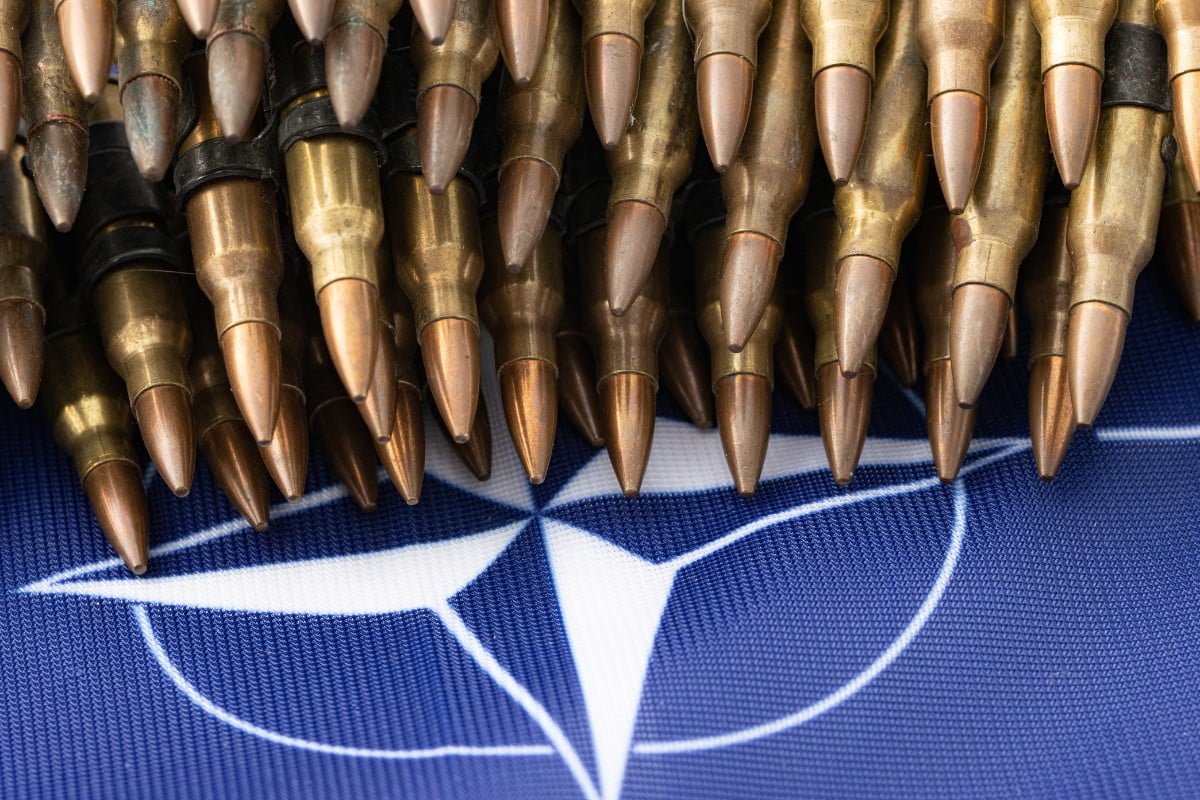
In 2022, for example, under her leadership, Unite backed a TUC Congress motion that called for an increase in defence spending. Graham has also been vocal in her support for the NATO-backed regime in Ukraine.
In one recent letter, responding to criticisms originating from Skwawkbox, Graham implicitly attacks activists who have been targeting arms factories, including sites where workers are organised with Unite.
What she fails to mention, however, is that activists have only resorted to such actions because of the lack of action coming from the trade unions – including Unite.
We have our own comradely criticism of the methods that have been used by activists, in frustration, to blockade such companies.
Graham, however, denounces such action on the grounds that the union’s priority is “always the protection and advancement of our members’ interests at work”. This is reflective of her narrow, chauvinistic, reformist outlook.
Her letter also explicitly states opposition to “groups that look to build networks inside trade unions to undermine the defence industry or demand the disbandment of NATO and AUKUS”.
This is a clear statement of support for maintaining the arms industry and for western imperialism’s various alliances. Above all, it is a betrayal of the working class internationally, justified with lip service to “British workers’ interests”.
‘Apolitical’
This has always been the Achilles’ heel of Graham’s leadership. Her syndicalist approach to trade unionism has brought with it positives, including backing members to take bold strike action in many instances.
But this has always carried with it a supposedly ‘apolitical’ side. And this ultimately means coming down on the side of the British establishment, for example on questions like the arms industry.
In the class struggle, there can be no political neutrality. Any pretence of this, in reality, means lining up behind one’s own ruling class.
This tendency has been seen throughout history. Before WW1, for example, the French CGT trade union confederation was dominated by syndicalist trends. It had even declared itself to be officially “politically independent” in 1906.
Yet despite all their bold rhetoric about fighting for the working class in the workplaces, when the war broke out, its leaders agreed to not hold strikes for the duration of the conflict. They even actively backed the “defence of the nation”.
General secretary Léon Jouhaux, a staunch advocate of the CGT’s “political independence” even went as far as to say that the war could benefit the working class, by prompting a new international settlement on working conditions!
This betrayal resulted in divisions within the French syndicalist trend, between the nationalist and revolutionary trends – the latter of whom eventually looked towards the Communist International.
The main lesson from this is that there can be no neutrality. The labour movement cannot absolve or distance itself from politics. Workers’ leaders must politically stand for their class’ interests. And this ultimately means fighting for a clear revolutionary programme.
Any failure to do so, no matter how militant or radical one’s rhetoric, will always mean tailing the capitalists, in the end. This is exactly the case with figures like Graham today.
Leadership
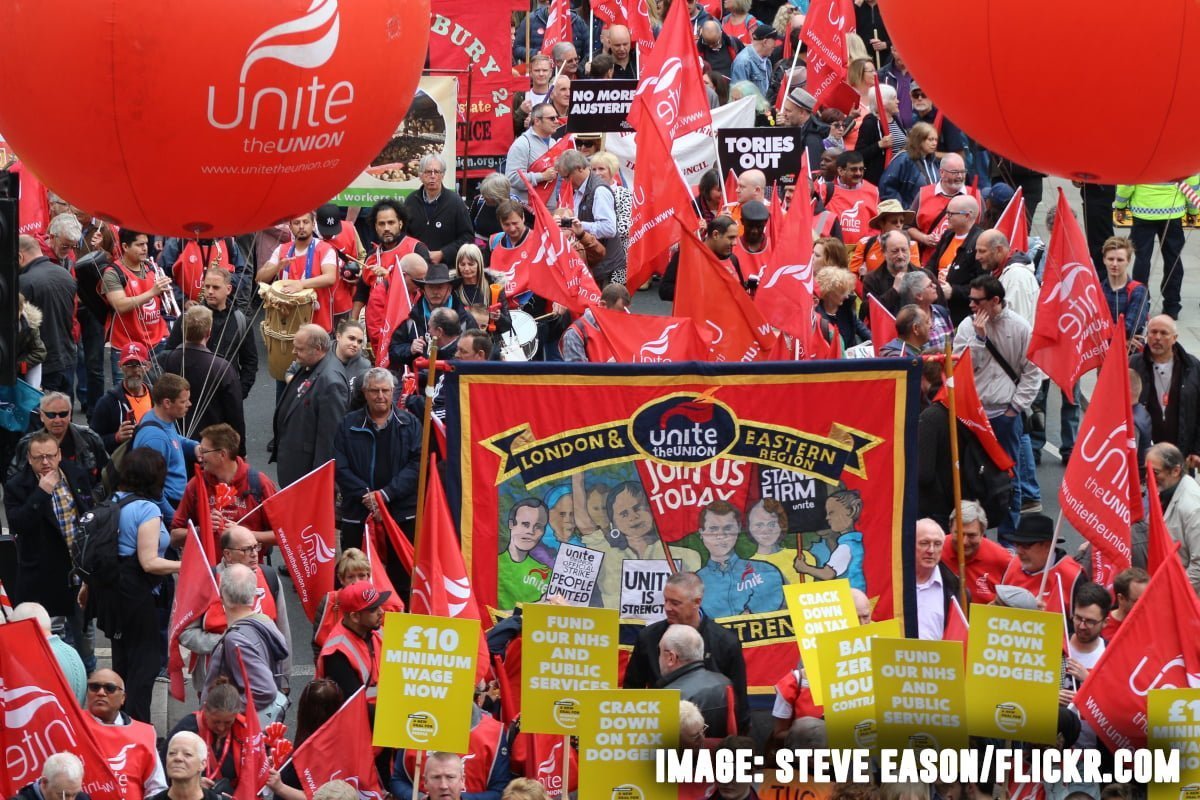
Instead of defending the status quo from behind the fig leaf of “members’ interests”, the trade union leaders should be fighting for a genuine socialist alternative.
This means struggling in the interests, not simply of “British workers”, but of the international working class. And this means fighting imperialism, starting with ‘our own’ imperialist ruling class.
In relation to the arms sector, Unite should demand the nationalisation of the industry, with factories repurposed to make socially-useful products, all while maintaining members’ pay and jobs – as was suggested by workers themselves in the 1970s with the famous Lucas Plan.
Graham’s failure to present such a programme is the result of her reformist politics: working within the confines of the capitalist system, rather than seeking to overthrow it.
Unite members therefore deserve a trade union leadership that is willing to be bold, outspoken, and militant politically, not just industrially, both on matters at home and abroad.
This does not mean a return to a UL-led union, which was equally reformist.
What is required instead is to build up a revolutionary communist leadership that is both fighting and democratic, based upon the militancy of the union rank-and-file.
This is what the RCP is aiming to do – in Unite and across the trade union movement.
‘Mutinous’ mood among Nautilus members
Gavin Ribeiro
Royal Fleet Auxiliary workers, organised in the Nautilus union, have voted for strike action for the first time in history. These are civilian sailors who assist the Royal Navy.
The ballot saw a 60 percent turnout, with 79 percent voting in favour of strike action, and 85 percent voting for action short of a strike.
The Nautilus union said that a 4.5 percent offer was received, which falls well below inflation. These auxiliaries have had a real-terms pay cut of more than 30 percent since 2010, the union claims.
In a message to the Ministry of Defence, Martin Gray, director of organising at Nautilus said: “For this group of professionals to have reached a point that they feel their only option is to vote for strike action…it should be a huge red flag that something needs to be done.”
As hard as the hated Tory government wants to put out the fires of the class struggle, the spectre of industrial militancy continues to haunt them.
These are technically civilian workers, so this doesn’t class as a mutiny. Nevertheless, it probably feels the same to top brass. Behind every strike, they always glimpse a ‘red flag’ – of revolution.





